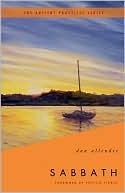More on this book
Community
Kindle Notes & Highlights
As Americans, we tend to be proud, distracted, and afraid.
Boasting about work is a national pastime. The one who works harder, against greater odds, and with fewer resources to gain the greatest ground wins. We are proud that we shoulder such immense responsibility and push our plow with the pride of aristocracy. Sabbath yanks us off our high horse, and for that reason alone few wish to dismount.
our senses close down when we attempt to take everything in.
We invent rules that seem orderly and sensible, if not righteous and moral, so that anyone who violates our code is somehow less than committed.
Weekends in America are, for many, a secular Sabbath that misses the glory of what God has called us to enjoy.
Many of us are afraid of delight. It seems to stand in such contrast to our harried multitasking.
We are driven because our work brings us power and pride that dulls our deeper desire for delight.
Humanity is not made for Sabbath; Sabbath was made for all God’s creation:
in our perspective, we can at least store up our self-righteousness in an account to be withdrawn to pay the daily incurring debts of failure.
Beauty is both what we crave and more than we can bear.
Awe must propel us to gratitude.
What intrigues, amazes, tickles your fancy, delights your senses, and casts you into an entirely new and unlimited world is the raw material of Sabbath.
Delight requires the courage to be attentive, intentional, and diligent.
It will not happen without planning and preparation.
It will not serve us well if the Sabbath is entered, or even planned, in busyness.
more than half of white-collar workers log more than forty hours a week, and 75 percent of those who work more than forty hours do work on the weekend.3 Studies tell us that 37 percent of Americans take fewer than seven days off per year. Only 14 percent take vacations of two weeks or longer.
We spend and use time, as if it really were a commodity.
We chafe at the thought that time is not under our control.
the more we treat time like an extension of a machine, called a clock, the more we are bound to time as if it is the boss and we are the slave.
Time is not lost or gained, spent or used—one can only do that with space: time can only be honored as a gift.
Speed becomes a drug that helps us escape seeing our empty, dull, time-addicted lives.
Sabbath was given to humanity before the fall of humanity into sin
Chitchat is like junk food—it is quickly filling and often causes bloating.
Joy doesn’t just happen, nor is it served up on demand.
“beauty indicates nothing: neither exactly a quality, nor a property, nor a function, not even really a subjective reaction to an object or occurrence. . . . Yet nothing else impresses itself upon our attention with at once so wonderful a power and so evocative an immediacy.”
“God’s beauty is God’s power to attract, to give pleasure, to create desire, to awaken joy and wonder.”
Jesus is unique and generously opulent.
nature functioned like a school of desire that awakens in us a hunger for beauty.
That combination of sharing and celebrating is, perhaps, the most radical of all the implications of the teaching and practice of Jesus.”
The reason of creation is God—which is no explanation, yet it offers a radical beginning point to consider how we are to live out our Sabbath, the day that most defines how we are to live our lives.
Sabbath is not a break from work; it is a redefinition of how we work, why we work, and how we create freedom through our work.
We demand freedom, yet we fear the risk required to recreate in a manner that has such openness, vulnerability, and potential for failure.
If one can’t lose, then it is not play.
“What do you most want to be, to do, to know, and to give away in the last third of your life?”
To create opportunity for another to know joy is regenerating both for the giver and for the one who receives,
The bitter tar of accusations will, over time, be the residue that steals, kills, and destroys beauty.
The structure of accusation and contempt and the binding of cobelligerents together on the basis of gossip and acrimony is how we keep denominations, tribal alliances, and political parties together.
One cannot create without pretending.
Pretending is risking the status quo—turning from the past to create a new future, dreaming what has not yet been for the sake of an unseen glory.
Curiosity is a gift of the Spirit. It loves to be taken as a guest into the chambers of wonder to be humbled and lifted up only to ask, Is there more?
Ambition leads to the demand for the shortest path between points to gain the most in the least amount of time; wonder calls the heart to explore the unexpected, nonlinear paths that often create a new unity that could not be expected when one first began.


